 Petzlover
Petzlover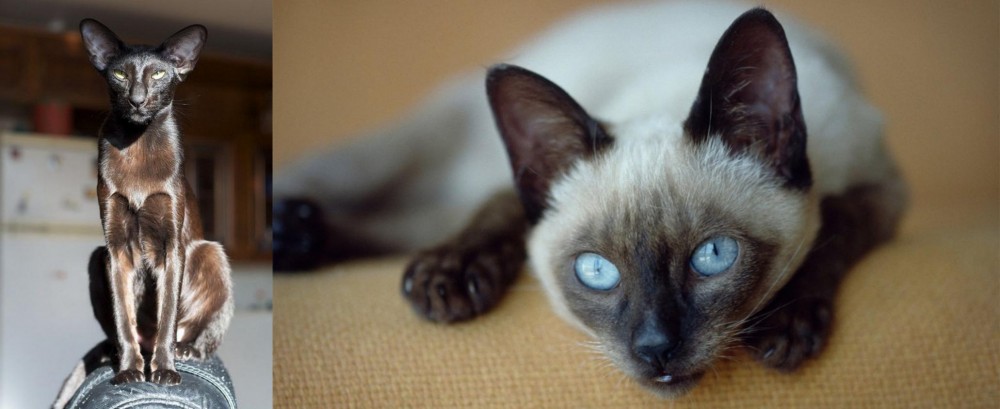 Oriental Shorthair is originated from United Kingdom but Siamese is originated from Thailand. Both Oriental Shorthair and Siamese are of same weight. Oriental Shorthair may live 5 years less than Siamese. Both Oriental Shorthair and Siamese has same litter size. Both Oriental Shorthair and Siamese requires Low Maintenance.
Oriental Shorthair is originated from United Kingdom but Siamese is originated from Thailand. Both Oriental Shorthair and Siamese are of same weight. Oriental Shorthair may live 5 years less than Siamese. Both Oriental Shorthair and Siamese has same litter size. Both Oriental Shorthair and Siamese requires Low Maintenance.
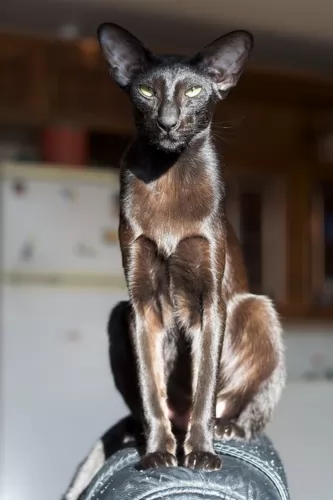 This domestic cat is also related to the Siamese Cat. Orientals come from a diverse group of cats, but they have their foundation in the Siamese breed.
This domestic cat is also related to the Siamese Cat. Orientals come from a diverse group of cats, but they have their foundation in the Siamese breed.
The cat was imported from Thailand to the UK during the 1800s. This particular cat was accepted as an actual breed in 1977. Quite a few of the top cat organizations recognize the Oriental Shorthair but as a Siamese.
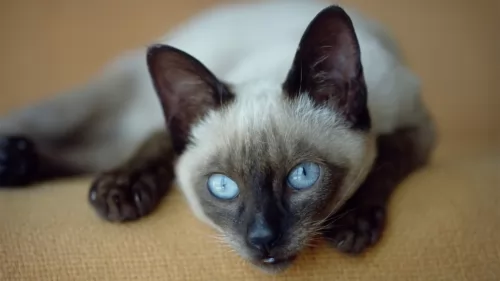 The Siamese cat is one of the most recognized cat breeds there are. The cat hails from Thailand and is the foundation stock for a number of other breeds.
The Siamese cat is one of the most recognized cat breeds there are. The cat hails from Thailand and is the foundation stock for a number of other breeds.
It comes in two distinct variations - traditional and the more modern Siamese.
In the United States, most of the top cat registries only consider the 4 original fur colors as Siamese – chocolate point, seal point, blue point, and lilac point.
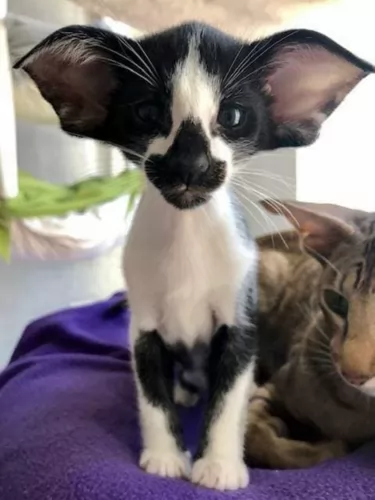 The Oriental Shorthair has a longish head with a slender neck and large ears. The legs are long and slender. The medium-sized cat weighs in the region of 3 – 5kg.
The Oriental Shorthair has a longish head with a slender neck and large ears. The legs are long and slender. The medium-sized cat weighs in the region of 3 – 5kg.
The eyes can be blue or green. Sometimes the cat will have one blue eye and one green eye. The coat is short and smooth and can be in a host of different colors.
The Oriental Shorthair is a curious, intelligent cat and they’re talkative too, loving to have conversations with their human family. They are cats that absolutely want to be part of the family. They don’t want to be left alone for too long either and get on well with children and pets in the home.
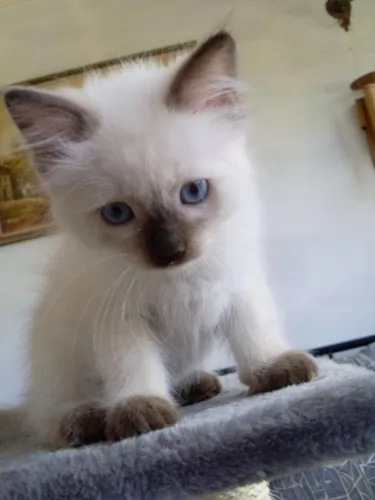 The Siamese cat is a medium-sized cat. Today’s Siamese cat is recognized by the triangular-shaped head, the slender, muscular body, the blue almond-shaped eyes, the largish ears, and the cream point colored coat.
The Siamese cat is a medium-sized cat. Today’s Siamese cat is recognized by the triangular-shaped head, the slender, muscular body, the blue almond-shaped eyes, the largish ears, and the cream point colored coat.
The face of the Siamese also has a mask of the same point color. Weighing at between 3 – 5kg, the Siamese has a long neck and slender tail.
All Siamese kittens are cream or white at birth, but they develop visible points in the first few months of life. The coat is short and glossy. By the time the kitten is 4 weeks old, the points are clearly distinguishable.
Siamese are affectionate, curious, playful, intelligent cats and are known for their vocal, social natures.
With the Siamese cat, you may see him bonding strongly with one particular person in the family.
They’re active cats and are also one of these cat breeds that are described as being more dog-like. Some of them become so attached to their human owners that they can become depressed or suffer from separation anxiety when left alone for long periods of time.
Because of the cat’s intelligence, he can be easily trained to respond to simple commands.
 The Oriental Shorthair promises to be an active companion in your life. It’s a cat that likes to involve itself with all the activities that its human family takes part in.
The Oriental Shorthair promises to be an active companion in your life. It’s a cat that likes to involve itself with all the activities that its human family takes part in.
He is a great entertainer too, and he loves all the attention he gets, thriving on being the center of attention.
The Oriental Shorthair cat is slightly more quieter than the Siamese cat but he will still want to tell you what he’s doing and what he wants.
It’s a cat that has many many colors and shades, but the color extends to the cat’s personality. It has a colorful, interesting, inquisitive personality.
The cat is lively and social and will fit in best with a lively, active home where there are also animals to keep him company. By having this loving cat in your home and life, you bring in joy and happiness.
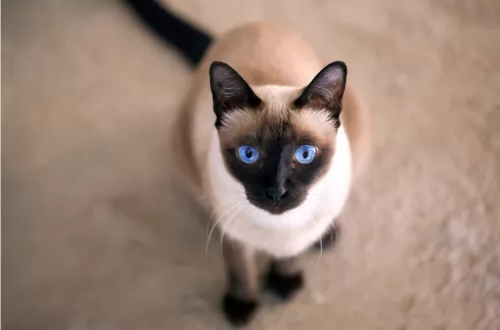 The Siamese cat is such a popular breed and with good reason. It makes a splendid companion for single people, families, couples, and older people. It gets on well with children and other pets too.
The Siamese cat is such a popular breed and with good reason. It makes a splendid companion for single people, families, couples, and older people. It gets on well with children and other pets too.
However, it is an energetic cat and won’t relish lying around day after day. He will want you to play with him and exercise him too, providing him with a stimulating environment.
These are such affectionate cats too, that it will be too sad if he lands up in a home where people don’t provide him with love and care. In exchange for that, you couldn’t ask for a better companion and friend.
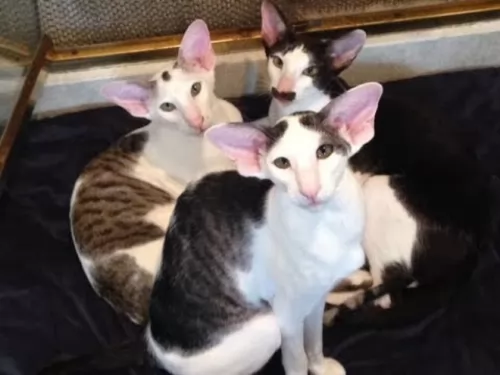 Oriental Shorthairs share some of the same health issues as Siamese cats. Make sure, if your cat shows signs of illness that you have pinpointed a vet in your area.
Oriental Shorthairs share some of the same health issues as Siamese cats. Make sure, if your cat shows signs of illness that you have pinpointed a vet in your area.
Things such as asthma, bronchial disease, lymphoma, neurological disorders, and gastrointestinal problems will need to be seen by the vet.
Think about having your cat spayed or neutered. Not only is this surgery important for preventing unwanted pregnancies, but it can also remove the urge for the cat to roam. The procedure has health benefits for your cat too.
Ensure that your Oriental shorthair has his vaccines up to date. These vaccines are important for preventing your cat from getting some deadly feline diseases. Kittens usually get the first vaccines between the ages of 6 and 8 weeks. Certainly, if you decide to go on holiday and you want to board your cat, the boarding kennels will require that the vet’s card and vaccines are 100% up to date.
Prevent parasites by using a treatment subscribed for your pet by the vet.
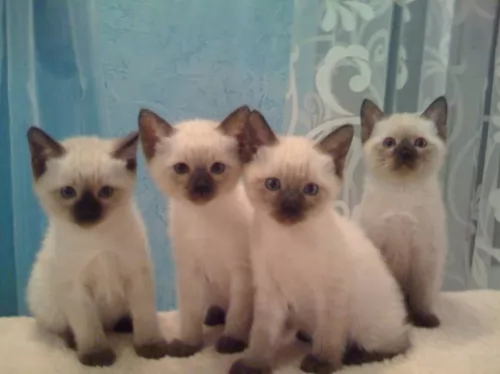 With good care, your Siamese cat can live to be between 12 and 20 years of age. It is a slim cat, so you want to keep him that way as becoming overweight can put a whole lot of pressure on the cat’s joints and bring on other health issues.
With good care, your Siamese cat can live to be between 12 and 20 years of age. It is a slim cat, so you want to keep him that way as becoming overweight can put a whole lot of pressure on the cat’s joints and bring on other health issues.
There are always some common cat diseases to watch out for and one of these is mammary tumors. They also battle with gastrointestinal problems and lung infections.
They are actually prone to respiratory problems, but this is more seen in younger cats. Upper respiratory infection with the Siamese cat will usually last about a week or it can go on longer.
Your cat with have a nasal or eye discharge, will be drooling as well as have ulcers around the nose and mouth with aches and pains aa well as lethargy.
Make sure that your Siamese cat is up to date with his vaccinations.
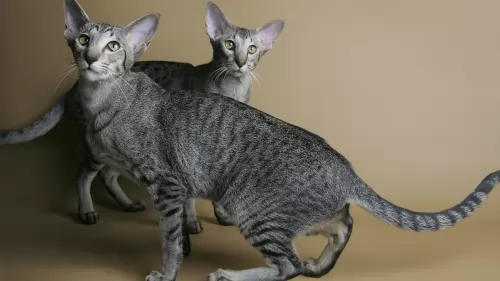 The short glossy coat doesn't shed much and the cat is considered low maintenance. A brush once a week will be adequate. A wipe down with a damp cloth will keep the cat dust-free and shiny.
The short glossy coat doesn't shed much and the cat is considered low maintenance. A brush once a week will be adequate. A wipe down with a damp cloth will keep the cat dust-free and shiny.
Just doing this for your cat is good for the cat’s morale as he thrives on attention, relishing the human interaction he gets during grooming.
Trim his nails, particularly if he is an indoor cat.
Keep your Oriental Shorthair lean and mean by not overfeeding him. The cat’s build is designed for slimness and he won't do at all well with the extra weight. The extra weight can lead to lots of health problems, one of which is diabetes.
If in any doubt as to how much to feed your cat, consult your vet about portion sizes. There are excellent commercially manufactured cat foods on the market, and the manufacturers know that cats are carnivores and that the best cat goods are high in protein.
Avoid giving your cat any kind of human food. Never leave him without a constant supply of fresh, cool water.
Provide your cat with a litter box and keep the box free of cat droppings. You can invest in small rakes from the pet shop and they make it easy to rake up the feces and dispose of them. Change the litter regularly too.
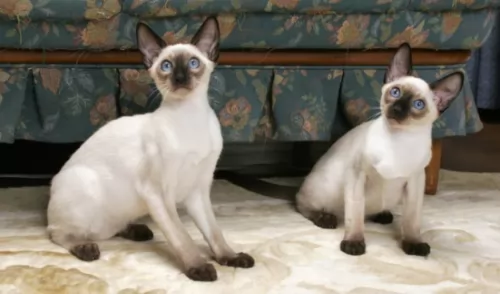 Good diet is one of the most important ways to care for your Siamese cat. Your cat is a carnivore and you therefore need to ensure he gets an appropriate diet otherwise you’re going to be spending more time at the vet with a sick cat than you’d like to.
Good diet is one of the most important ways to care for your Siamese cat. Your cat is a carnivore and you therefore need to ensure he gets an appropriate diet otherwise you’re going to be spending more time at the vet with a sick cat than you’d like to.
Always check with your vet if you have any uncertainties about feeding your Siamese kitten. Kittens will eat different food to an adult, and even in adulthood, there is commercial cat food manufactured for adult cats, pregnant felines, lactating cats, energetic cats, senior cats and sick cats.
Where possible, you will need to try and provide your cat with some fresh, raw meat too.
Never leave your cat without a bowl of fresh, cool water night and day.
The coat of the Siamese cat is thick, soft, and silky and he will require a brush every week to keep it like that.
They are agile, athletic cats, loving to jump up onto perches so it will be a good idea to provide a climbing tree or some other equipment where the cat can leap up onto.
Provide your cat with a litter box and make sure that the cat’s feces are removed every single day.